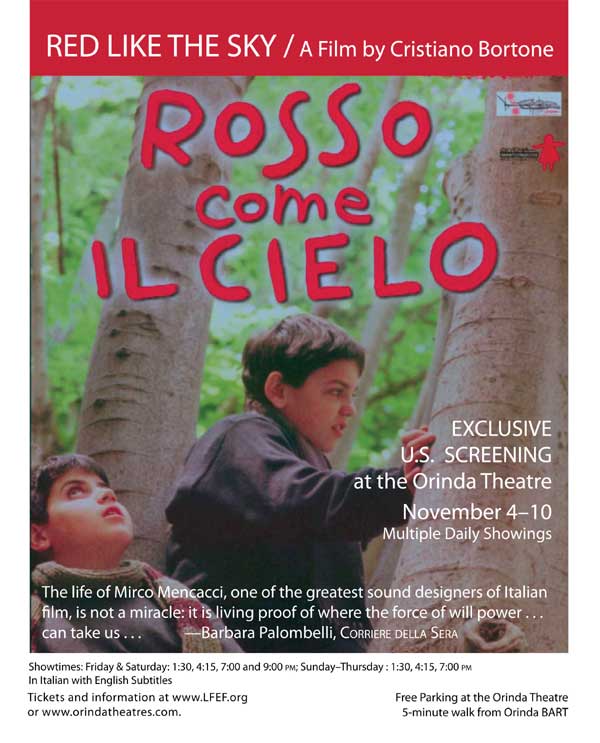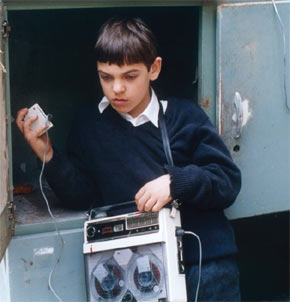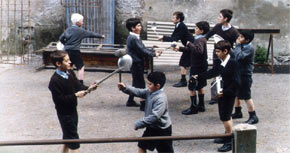 Mirco (Luca Capriotti), is a young, Italian boy, growing up in the early 1970’s, in what is obviously a loving home. Both Mirco’s father (Simone Colombari) and mother (Rosanna Gentili) encourage and support Mirco’s enthusiasm for movies. They take him to the cinema, and when Mirco complains that “Everyone else has a television,” his father promises they will soon have one as well.
Mirco (Luca Capriotti), is a young, Italian boy, growing up in the early 1970’s, in what is obviously a loving home. Both Mirco’s father (Simone Colombari) and mother (Rosanna Gentili) encourage and support Mirco’s enthusiasm for movies. They take him to the cinema, and when Mirco complains that “Everyone else has a television,” his father promises they will soon have one as well.
Active and inquisitive, Mirco is a typical boy, ever willing to challenge authority. One afternoon, after playing with friends, Mirco returns home to repair a broken toy and is distracted by the forbidden fruit of his father’s shotgun hanging high on the wall, well beyond Mirco’s reach. But parental securing of the gun is no challenge for Mirco, as he climbs up to take it and the inevitable happens.
The accident leaves Mirco partially blind, only able to discern shadows. As Italian law does not allow blind children to attend regular public schools, and Mirco’s heartbroken parents cannot afford a private tutor, Mirco is sent to a well known Catholic boarding school / institution for the blind, in Genoa.
The school’s stern headmaster (Norman Mozzato), also blind, has apparently discovered the ideal solution for finding “appropriate, productive” lifestyles for these young boys he considers hopelessly handicapped. As his own life’s dreams and ambitions apparently died along with his eyesight, so too must it be for everyone else. There is no place for the “luxury” of creative expression, in the world of the blind.

But Mirco has other ideas. And while he has some difficulty in adjusting at first, we soon learn it is not a bitterness for his being blind that troubles him, but for the attempts of others to stifle his inner passion and creative spirit. What first appears as an understandable anger becomes revealed, simply, as the yearning of the creative soul seeking an outlet for expression.
Mirco befriends another boy named Felice (Simone Gulli) who has been blind since birth. In one poignant scene we glimpse that Mirco has some unique gift for capturing and communicating the essence of reality, transcending visual blindness by describing colors to his new friend. “Blue is like riding your bike and the wind hits you in the face,” Mirco tells his new friend, and “Red is like fire. Like the sky at sunset.”
The persistence of Mirco’s creative energy becomes focused, as he discovers a reel-to-reel tape recorder and soon, teaches himself how to use it. He learns a new way to bring his imaginations to life by telling stories with recorded sounds. When Mirco’s teacher, Don Giulio (Paolo Sassanelli) assigns an essay about the four seasons to be written in Braille, Mirco follows his own path and creates a recording that tells the story. Don Giulo recognizes the boy’s genius, but the headmaster, of course tries to deny and extinguish the Mirco’s blossoming, creative e spirit.
Mirco attracts the attention of a girl, Francesca (Francesca Maturanza), who becomes a collaborator in his audio fabrications, and it isn’t long before their exciting new activities enchant the other children in the school, even the class bully, Valerio (Andrea Gussoni).
The film follows a predictable path, as the mean-spirited headmaster tries to maintain order, but Don Giulo rises to champion Mirco’s cause, and the children perform for their parents in an “ear opening,” watershed performance. While it may come off as bit simplistic, its impact is enhanced by the fact that the film is based upon the true life story of the award-winning, Italian sound editor, Mirco Mencacci.
Produced and directed by Cristiano Bortone, Rosso Come il Cielo (Red Like the Sky) is a delightful, must-see film by any standard. Its well crafted cinematography and artful directing make it visually rich, and all of the roles are superbly acted. Without a shred of hesitation, it is five out of five, very solid stars for this film!
Leave a Reply